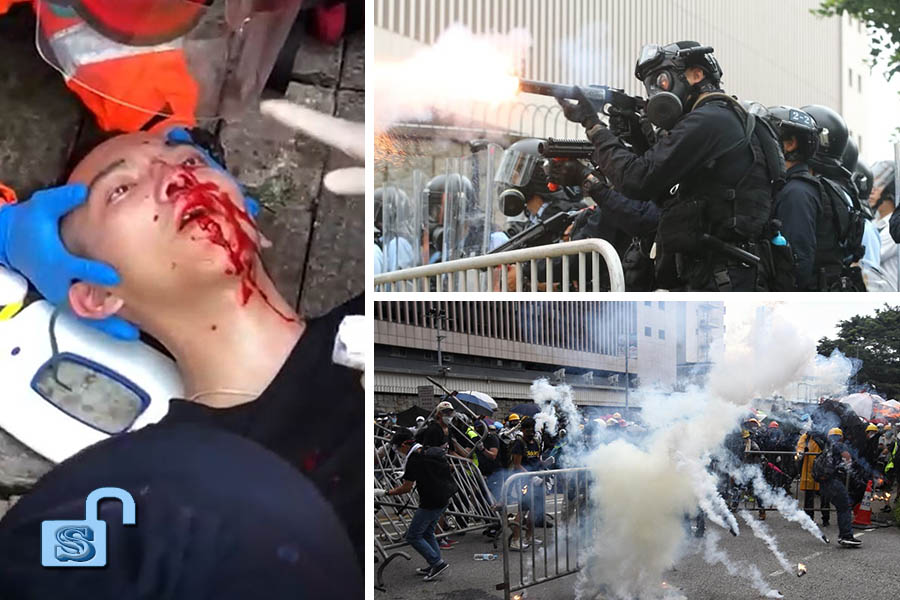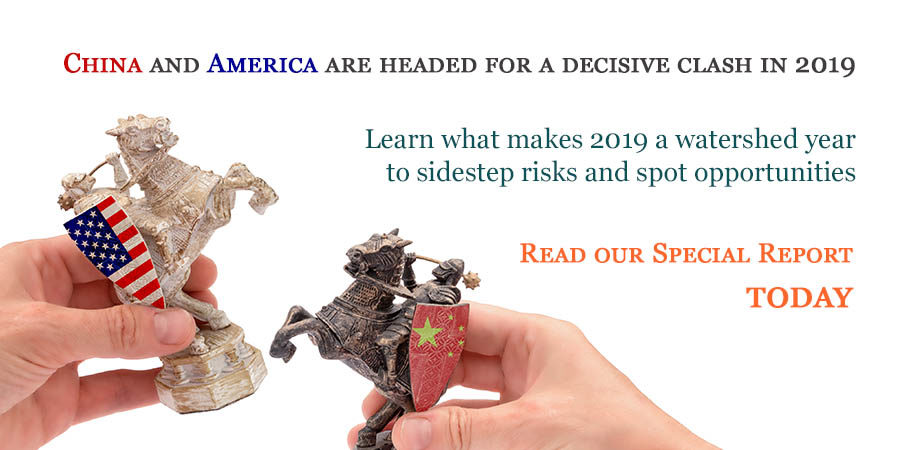◎ The present situation in Hong Kong is ripe for Xi’s political rivals to exploit and shift the balance of the struggle.
Mass protests in Hong Kong against a proposed extradition law recently took a violent turn with police and protesters clashing in the city center. We believe that how events in Hong Kong in the coming days could shape out hinges on the state of the “you die, I live” factional struggle in the Chinese Communist Party.
The backdrop:
On June 12, Hong Kong police fired tear gas and rubber bullets on protesters gathered outside the city’s Legislative Council. According to reports from Hong Kong news outlets, at least one person was knocked unconscious after receiving a head injury. Police said in a press conference that they had no choice but to use batons, pepper spray, beanbag guns, tear gas, and rubber bullets because some protesters had thrown bricks, metal barriers, and other objects at them. Hong Kong Police Commissioner Stephen Lo declared the skirmishes on June 12 to be a “riot.” In Hong Kong, rioting is punishable by up to 10 years in prison and police can take riot control measures.
The protesters had blocked off all paths leading to the central government offices and LegCo, and forced lawmakers to postpone a debate on the extradition law. A day earlier, the Hong Kong legislature president announced moves that would bring the bill to a vote on June 20, or more rapidly than usual.
Protesters have vowed to stay until the pro-Beijing Hong Kong government scraps the proposed law. In an interview with a Chinese language Hong Kong media outlet, a teenage protester expressed a popular sentiment, “Since the demonstrations are useless, I might as well be shot dead.”
According to some Chinese language media reports, the Zhongnanhai leadership was “completely shaken” by developments in Hong Kong and dares not “act carelessly.” A situation center has been set up to monitor events and Politburo members were reportedly on night duty at the center. Also, the Zhongnanhai leadership and Party elders are “most concerned” about the June 9 protest march in Hong Kong which drew 1.03 million participants.
Our take:
We laid out the connection between the Hong Kong government’s push to pass the proposed extradition law and the CCP factional struggle in a previous article. Presently, the situation in Hong Kong is ripe for Xi’s political rivals, such as the Jiang faction and other interest groups, to exploit and shift the balance of the struggle.
We believe that the Jiang faction could try to escalate matters in Hong Kong to the point where the Xi leadership would be pressured to carry out a Tiananmen-style crackdown. Here is how CCP factional elements might provoke an escalation in the 2019 protests:
- It is very likely that the CCP had learned its lessons from the 2014 Umbrella Movement protests and took steps to “remedy” the “crowd escalation” situation over the past five years. For instance, sympathetic police officers in key positions could have been gradually replaced by “hardliners” with pro-Beijing leanings. This might explain why the June 12 clashes were quickly designated as “riots” and brutal action was taken to drive away the protesters.
- The People’s Liberation Army moved to crush the student protesters in Tiananmen Square on June 4, 1989 because clashes had earlier broken out between protesters and soldiers. According to Chinese language media reports, some of the skirmishes, including the burning of vehicles, were triggered by undercover security forces pretending to be protesters. Thus, there is a very real possibility that undercover CCP operatives in Hong Kong could disguise themselves as protesters or police and find ways to provoke bloodshed. Once there is bloodshed, the Chinese regime has a legitimate excuse to send the troops in to “suppress” the situation.
- At the Chinese foreign ministry’s regular press conference on June 12, a journalist said that there are “media reports that some armed forces are heading towards Hong Kong” and asked if “mainland really sent forces to Hong Kong to maintain stability.” Foreign ministry spokesperson Geng Shuang brushed off the news as “disinformation” and “groundless rumor,” but we do not put it past the CCP to have troops or other security forces on standby in neighboring Shenzhen in the event that “stability maintenance” is required in Hong Kong. And if there are indeed security forces ready in Shenzhen, then the possibility that some might go undercover in Hong Kong to stir trouble cannot be ruled out.
Should Xi Jinping authorize a crackdown, he would be compromised on two fronts. On the factional struggle front, the Jiang faction would gain strong leverage over Xi because he would have serious blood on his hands like all previous Party leaders and would have to bear full responsibility for the “Hong Kong Incident” and its fallout. In one move, the Jiang faction would be able to prevent Xi from targeting them for serious human rights crimes and force Xi to relinquish authority. Meanwhile, Xi, like the Jiang faction, would have to prop up Party rule at all costs for self-preservation. This means that structural reforms in China are permanently off the table, which in turn means that the Chinese regime will never reach a trade deal with the Trump administration. The escalation of the Sino-U.S. trade war and “new cold war” would eventually bring dire consequences for both Xi and the Chinese regime.
Xi Jinping has only two options should the scenario arise where he must make a choice on whether or not to order a Tiananmen-style crackdown in Hong Kong. The first option is to order the crackdown in the name of preserving the Party and fully inherit the CCP’s entire pernicious legacy. The second option is to take no action and allow the situation in Hong Kong to defuse itself. This option, however, would exponentially raise Xi’s personal political risks and would likely force him to eradicate the Jiang faction for his self-preservation. (A Trump-Xi meeting at the G20, should it go ahead, will likely provide clues about Xi’s decision on the Jiang faction.)
Get smart:
The people of Hong Kong are not entirely without agency in the latest CCP factional skirmish. By tapping into what the Party fears most, the Hong Kong people can use creative, nonviolent solutions to simultaneously challenge the Party and close off the Tiananmen-style crackdown option to the Xi leadership. To know more about the solutions, contact us.













